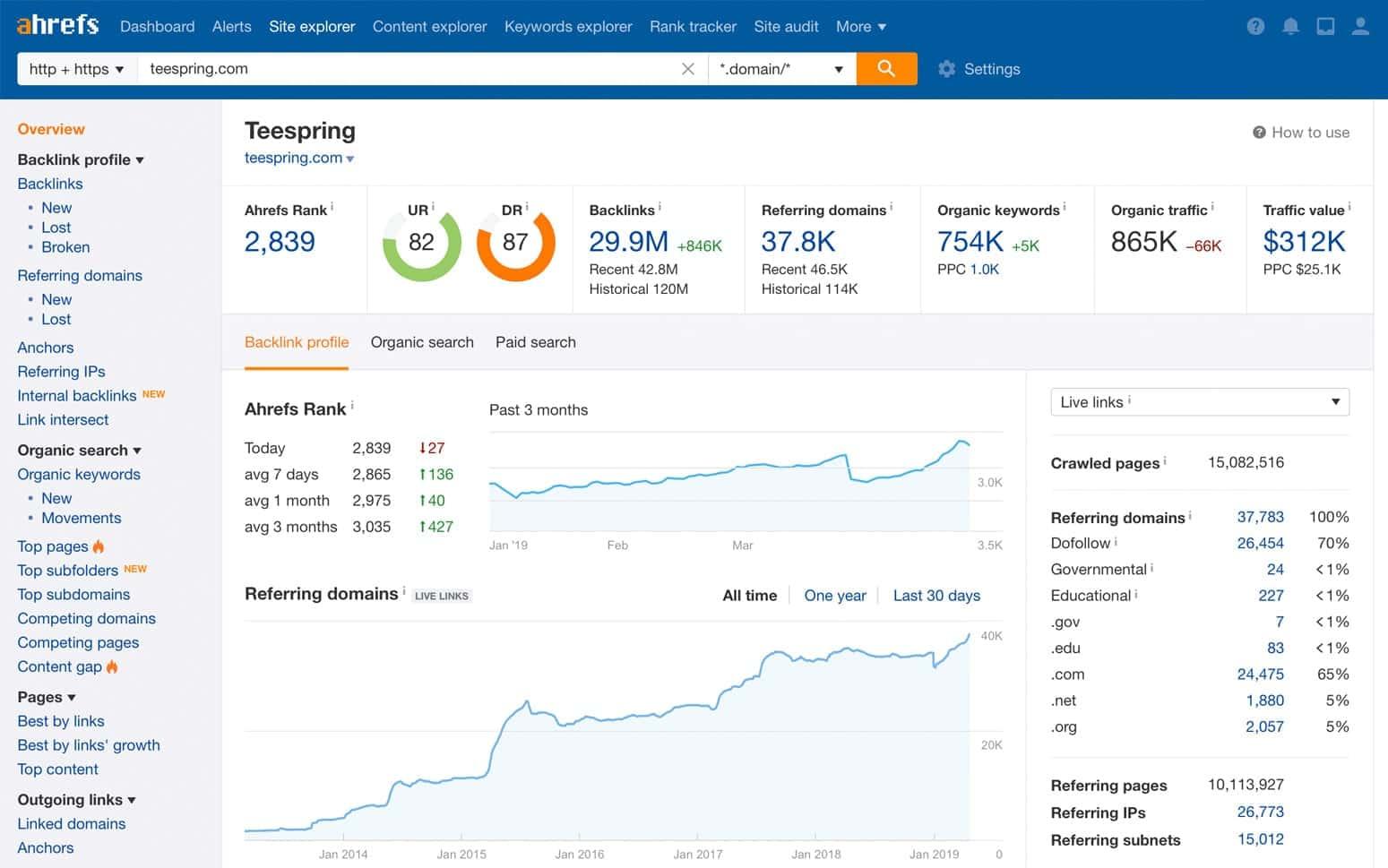Are you ready to take your website’s performance to the next level? If so, your in the right place! In today’s digital landscape, having a stunning website is just the first step. To truly stand out and attract visitors, your site needs to be optimized for search engines.That’s where SEO audits come into play.Think of an SEO audit as a health check-up for your website—it’s essential for identifying what’s working, what’s not, and what can be improved.But with a plethora of SEO audit tools available, how do you choose the right ones? Don’t worry, we’ve got you covered! In this article, we’ll explore the 7+ best SEO audit tools that can help you uncover hidden opportunities and fix critical issues.Whether you’re a seasoned pro or just starting out, these tools will empower you to enhance your site’s visibility and performance. Let’s dive in and find the perfect solution to boost your site’s SEO game!
understanding the Importance of SEO Audits for Your Website
SEO audits are a crucial aspect of maintaining a healthy and effective online presence. They serve as an in-depth analysis of your website’s performance, identifying areas for advancement and ensuring that your digital marketing strategies are aligned with the latest best practices. By regularly conducting SEO audits, you can uncover hidden issues that might potentially be hindering your site’s visibility and overall performance.
One of the primary benefits of an SEO audit is that it helps you understand how search engines view your website. This involves analyzing various elements, such as:
- On-page SEO factors: Title tags, meta descriptions, header tags, and content quality.
- Technical SEO aspects: Site speed, mobile-friendliness, and crawlability.
- Off-page SEO elements: Backlink quality and social signals.
Moreover, SEO audits can highlight opportunities for keyword optimization. By examining the keywords that are currently driving traffic to your site, you can identify potential gaps and new areas to target. This proactive approach ensures that your content remains relevant and aligned with what your audience is searching for.
Another significant advantage is that SEO audits can enhance user experiance (UX). A well-optimized website is not onyl about search engine rankings; it’s also about providing a seamless experience for your visitors. This includes:
- Improving navigation: Ensuring users can easily find what they need.
- reducing bounce rates: Engaging content that keeps visitors on your site longer.
- Enhancing loading speed: Fast-loading pages lead to better retention rates.
Additionally, SEO audits help in tracking your progress over time. By documenting changes and monitoring their impact, you can fine-tune your strategy and make informed decisions based on data rather than guesswork. This iterative process is vital in the ever-evolving digital landscape.
To illustrate the importance of these audits, consider the following table of common SEO issues and their potential impact:
| SEO Issue | Potential Impact |
|---|---|
| Broken links | Decreased user trust & poor SEO rankings |
| Duplicate content | Confused search engines & diluted authority |
| Slow page speeds | Increased bounce rates & reduced conversions |
| Poor mobile optimization | Loss of mobile traffic & lower rankings |
conducting thorough SEO audits equips you with the insights needed to optimize your website effectively. They not only bolster your search engine visibility but also enhance user satisfaction, ultimately driving better business results. Investing time and resources into regular audits can help you stay ahead in the competitive digital landscape.
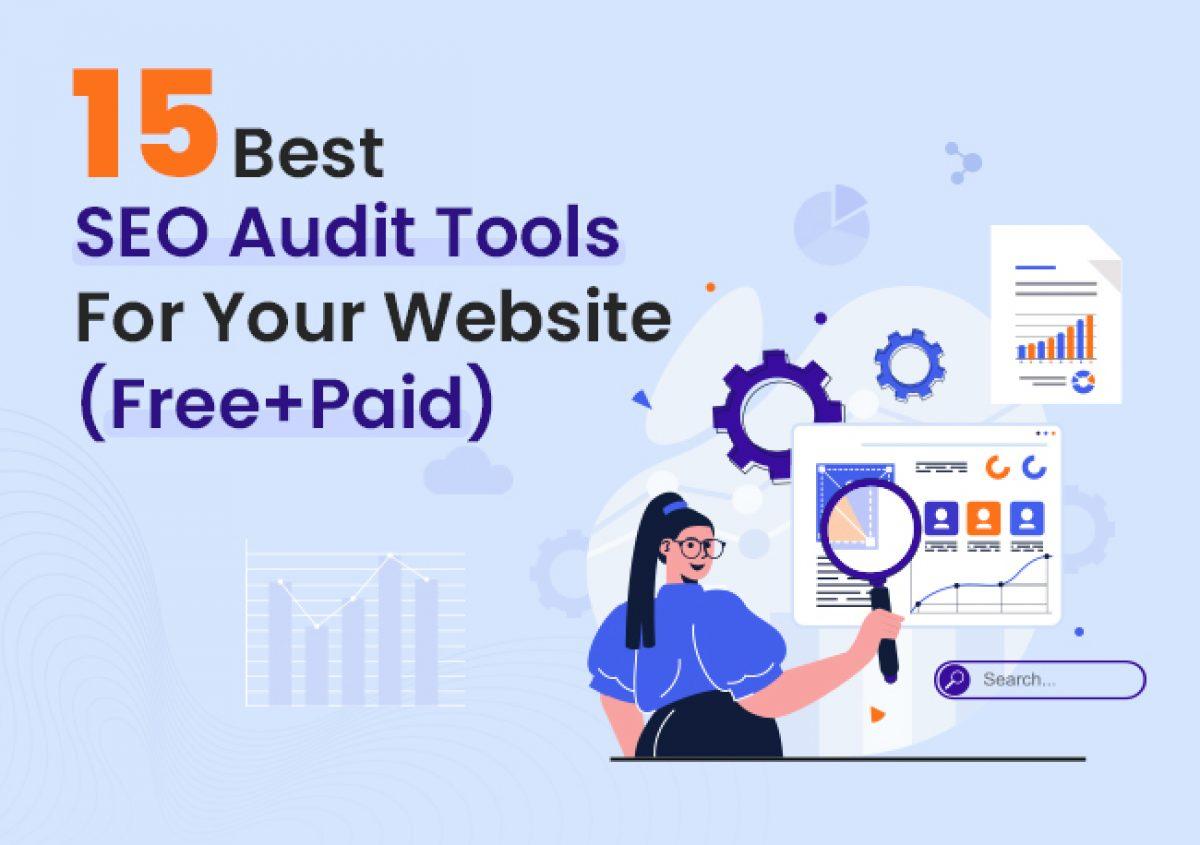
Key Features to Look For in a Reliable SEO Audit Tool
When searching for an effective SEO audit tool, it’s crucial to identify features that will not only enhance your understanding of your website’s performance but also empower you to make informed decisions. Here are some essential features to consider:
- Thorough Site Analysis: A reliable SEO audit tool should offer a thorough analysis of your website, covering aspects like technical SEO, on-page SEO, and off-page SEO. This holistic approach ensures that no stone is left unturned.
- User-Friendly Dashboard: Look for a tool with an intuitive interface that allows you to easily navigate through the data.A clean, well-organized dashboard can save you time and help you quickly identify areas for improvement.
- Keyword Tracking: Effective SEO audit tools frequently enough include features for tracking your keyword rankings over time. This capability is essential for measuring your progress and understanding how well your SEO strategies are performing.
- Backlink Analysis: Understanding your backlink profile is crucial for SEO success. Choose a tool that provides insights into your backlinks, including their quality and relevance, to enhance your link-building strategies.
Additionally,you should look for:
- Competitor Analysis: Gaining insights into your competitors’ SEO strategies can give you a competitive edge. A good tool should provide data on your competitors’ keywords, backlinks, and overall performance.
- Reporting Features: Look for tools that offer customizable reports. Being able to generate detailed reports can help you communicate results to stakeholders and set clear goals for future strategies.
- Integration Capabilities: Consider tools that easily integrate with other platforms you use, like Google Analytics or social media management tools. This can streamline your workflow and enhance your overall marketing efforts.
Lastly,ensure that the tool offers regular updates and customer support.The digital landscape is constantly evolving, and having access to the latest features and expert support can make a significant difference in your SEO efforts.
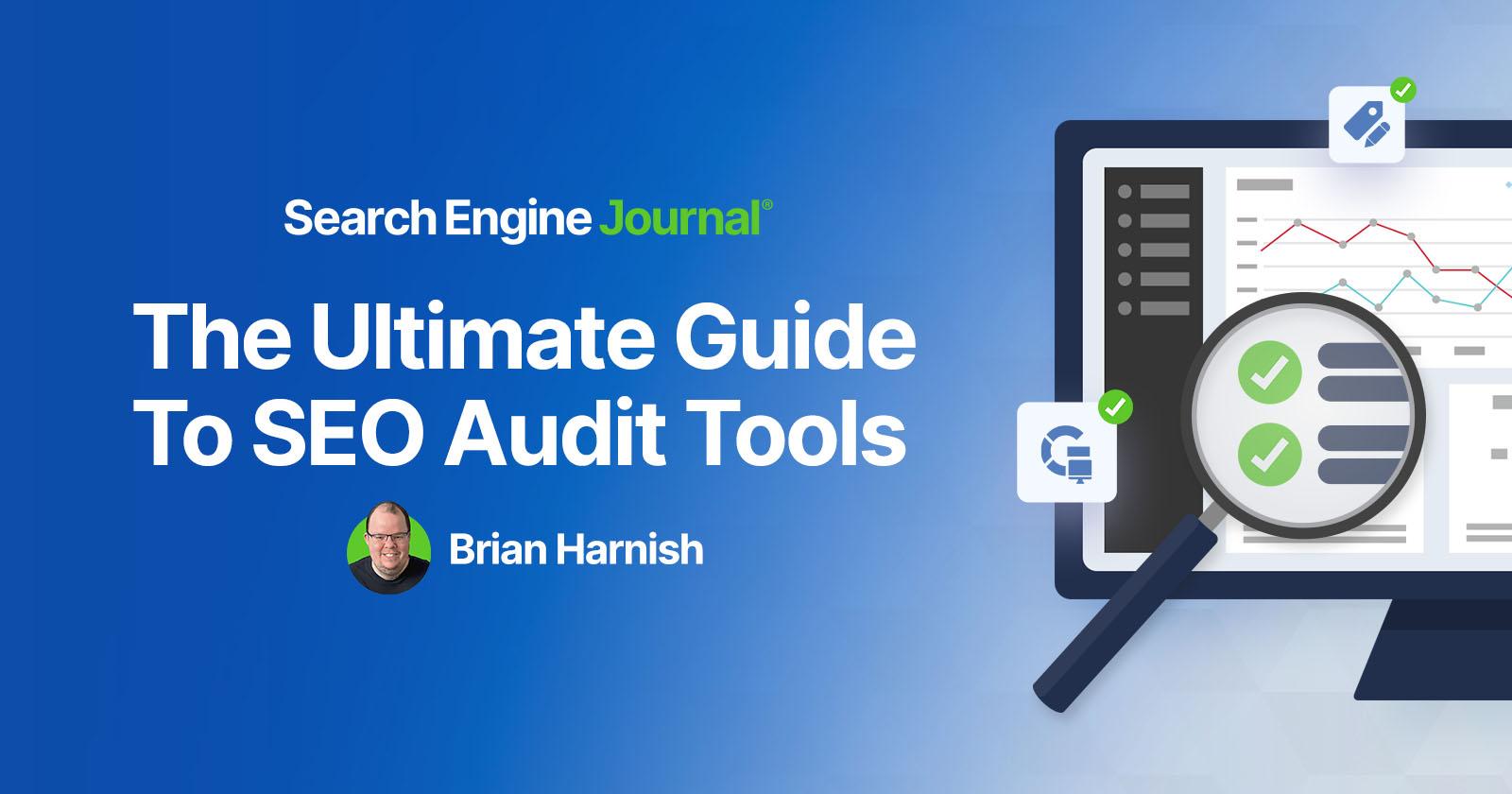
Unveiling the Top Tools That Can Transform Your SEO Strategy
with the digital landscape continuously evolving, having the right tools at your disposal can make all the difference in your SEO efforts. Fortunately, several powerful SEO audit tools can help you diagnose issues, track performance, and enhance your website’s visibility. Let’s dive into some of the top contenders that can elevate your SEO strategy.
Comprehensive Analysis at Your Fingertips
One of the most prominent features of today’s best SEO audit tools is their ability to provide a complete picture of your website’s health. For instance, tools like SEMrush and Ahrefs offer in-depth site audits, covering everything from backlinks to keyword rankings. The insights from these tools can help identify:
- Broken links that can harm user experience.
- Meta tags that need optimization.
- Page load speed issues that affect bounce rates.
Keyword Tracking Made Easy
Understanding which keywords drive traffic to your site is crucial for refining your content strategy. Tools such as Google Search Console and Moz Pro provide excellent keyword tracking capabilities. By using these tools, you can:
- Monitor keyword rankings over time.
- Discover new keyword opportunities.
- Analyse competitor keyword strategies.
Backlink Analysis for Authority Building
Links from reputable sites enhance your domain authority, and keeping track of your backlinks is essential. Tools like Majestic SEO and Linkody excel in this area. They help you:
- Identify the quality of your backlink profile.
- Monitor new and lost backlinks.
- Analyze competitor backlinks for strategy insights.
Streamlined Reporting and Insights
Robust reporting features can save you hours of manual data compilation. Tools like spyfu and Serpstat offer user-friendly dashboards that present data in a digestible format. With them,you can easily:
- Create customized reports for stakeholders.
- Visualize trends and performance metrics.
- Share insights with your team effortlessly.
Easy-to-Use Interface and Support
Intuitive interfaces are key to maximizing your SEO tool’s potential. Look for tools that not only provide powerful features but are also user-friendly.Many platforms, like Ubersuggest, come with extensive support resources, including:
- Step-by-step tutorials.
- active community forums.
- Customer support for troubleshooting.
Final Thoughts
Investing in the right SEO audit tools can vastly improve your website’s performance and visibility. By leveraging these tools, you empower yourself to make informed decisions that can lead to higher rankings, increased traffic, and ultimately, greater success. Don’t leave your SEO strategy to chance; equip yourself with the best tools available and watch your online presence grow.
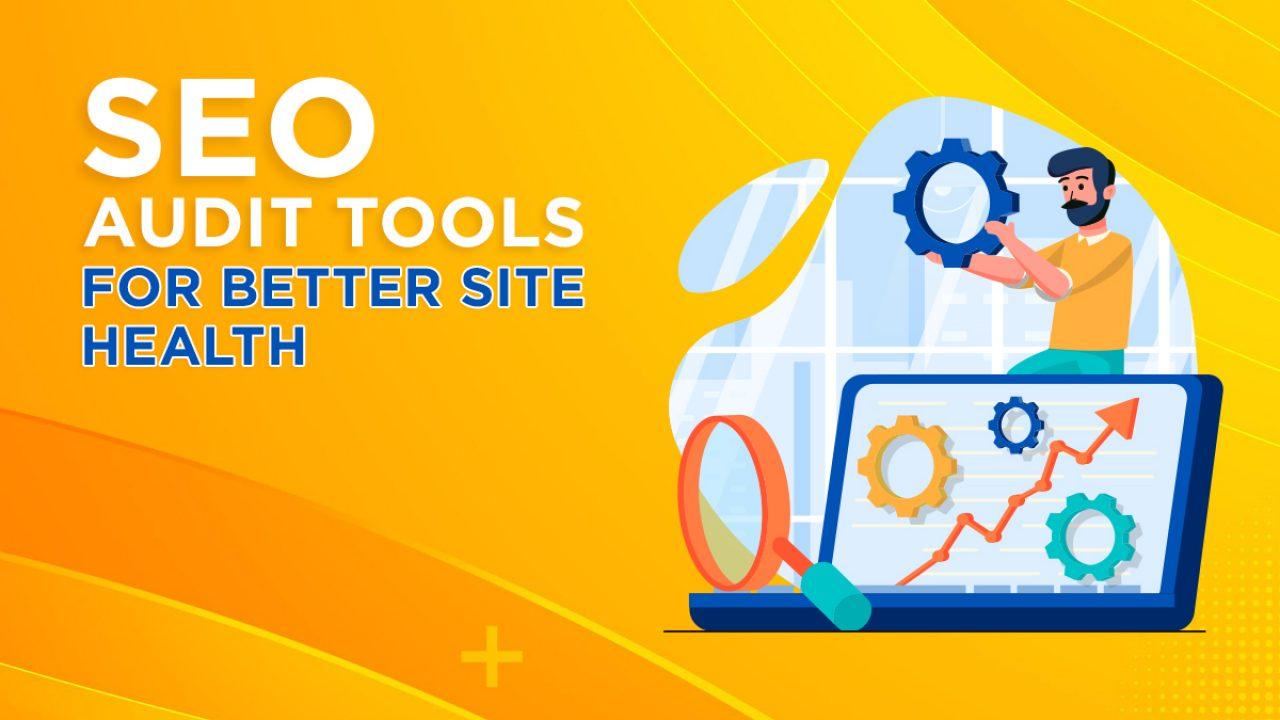
In-Depth Review of Each Tool: Pros and Cons
When it comes to SEO audit tools, each option brings unique strengths and weaknesses to the table. Here,we break down the most popular tools,highlighting their pros and cons to help you make an informed choice for your website.
1. SEMrush
Pros:
- Comprehensive site audits that cover a range of SEO metrics.
- Powerful keyword research capabilities.
- User-friendly interface that makes navigation a breeze.
- Integrates with other tools for a holistic view of your marketing strategy.
Cons:
- Can be pricey for smaller businesses.
- Some features may require a learning curve for beginners.
2. ahrefs
Pros:
- Robust backlink analysis to uncover your competitors’ strategies.
- Extensive database with up-to-date metrics.
- Great for content analysis and finding topic ideas.
cons:
- Not the most beginner-friendly tool.
- Costly for those just starting out in SEO.
3. moz Pro
Pros:
- Offers a user-friendly interface with detailed insights.
- Excellent keyword tracking and SERP analysis.
- Community support and educational resources are top-notch.
Cons:
- Limited capabilities in backlink analysis compared to competitors.
- Some features can feel outdated.
4. Google Search Console
Pros:
- Free tool that provides essential data directly from Google.
- User-friendly interface and easy to set up.
- Great for monitoring site performance and indexing issues.
Cons:
- limited features compared to paid tools.
- Data may not be as comprehensive as other options.
5. Screaming Frog
Pros:
- excellent for technical SEO audits with detailed reports.
- Ability to crawl websites of up to 500 URLs for free.
- Highly customizable with various SEO filters.
Cons:
- desktop application may not appeal to everyone.
- Interface can be overwhelming for new users.
| Tool | best For | Pricing |
|---|---|---|
| SEMrush | Comprehensive SEO analysis | Starting at $119.95/month |
| Ahrefs | Backlink analysis | Starting at $99/month |
| Moz Pro | keyword tracking | starting at $99/month |
| Google Search Console | Free SEO monitoring | free |
| Screaming Frog | Technical SEO audits | Free for up to 500 URLs, then £149/year |
Choosing the right SEO audit tool can substantially impact your website’s performance and visibility. Consider what features are most vital for your specific needs, and weigh the pros and cons of each tool carefully. Remember, the best tool is one that aligns with your goals and fits within your budget!
How to Select the Right SEO Audit Tool for your Business Needs
Choosing the right SEO audit tool can significantly impact your website’s optimization strategy. With so many options available, it’s essential to identify which features align best with your specific business needs. Here are some crucial factors to consider:
- Ease of Use: Look for a tool that offers a user-friendly interface, especially if you’re new to SEO. A simple dashboard can save you time and frustration.
- comprehensive Features: Ensure the tool covers all aspects of SEO, including on-page analysis, backlink audits, keyword tracking, and site speed checks.
- Integration Capabilities: Check if the tool integrates with other platforms you’re using, like Google Analytics or social media channels, to streamline your workflow.
- Reporting Options: The ability to generate customizable reports is essential. Choose a tool that allows you to present data in a way that resonates with your team or clients.
- Cost-Effectiveness: Consider your budget. Some tools offer free trials or basic plans that can provide significant value without breaking the bank.
- Customer Support: Reliable customer support can make a world of difference. Look for tools that offer live chat, email support, or extensive documentation.
Once you’ve narrowed down your options, it’s wise to test a few tools to see how they fit into your workflow. Many SEO audit tools offer trial periods, allowing you to get hands-on experience before making a financial commitment. During this trial,pay attention to how the tool performs on key metrics relevant to your business.
Additionally, consider the scalability of the tool. As your business grows, your SEO needs will evolve. Opt for a tool that can grow with you, offering advanced features as you require them. This foresight can save you time and effort later on when you realize your current tool no longer meets your needs.
Lastly, read reviews and case studies from other users. understanding how a tool has benefited similar businesses can provide valuable insights. Look for feedback on performance, customer service, and the overall effectiveness of the tool in improving SEO metrics.
By taking these factors into account, you’ll be better positioned to select an SEO audit tool that not only meets your immediate requirements but also supports your long-term digital marketing goals.
Maximizing Your Use of SEO Audit Tools for Optimal Results
When it comes to enhancing your website’s visibility, harnessing the full potential of SEO audit tools is essential.These tools not only help you identify problematic areas but also provide actionable insights to improve your website’s performance. To maximize their effectiveness, consider the following strategies:
- Understand Your Metrics: Familiarize yourself with key metrics such as organic traffic, bounce rate, and keyword rankings. Each tool offers different insights, so knowing what to look for can make a difference.
- Prioritize Issues: Not all issues are created equal. Focus on high-impact problems first, such as site speed and mobile usability, which can significantly affect user experience and search engine rankings.
- Regular Audits: Conducting audits on a regular basis ensures that your website remains optimized. Set a schedule—monthly or quarterly—to keep track of improvements and emerging issues.
Furthermore, integrating multiple tools can provide a more comprehensive view of your SEO health. While one tool might excel in backlink analysis, another may offer superior keyword research capabilities. By combining insights from various platforms, you can develop a well-rounded SEO strategy.
Here’s a simple table showcasing some of the top SEO audit tools and their standout features:
| Tool | Key Features |
|---|---|
| Ahrefs | Backlink analysis, keyword explorer, site audit |
| SEMrush | SEO writing assistant, site health checker, competitor analysis |
| Moz Pro | Page optimization suggestions, link building tools, rank tracking |
| Google Search Console | Performance reports, index coverage, mobile usability analysis |
don’t forget to implement the recommendations provided by these tools. Create a clear action plan based on your findings, and assign tasks to your team if you’re working with others. Tracking changes over time will not only help you measure the effectiveness of your efforts but also keep your SEO strategy agile and responsive to fluctuating trends.

Real-Life Success Stories: Businesses That Benefited from SEO audits
Many businesses have unlocked their potential through comprehensive SEO audits, discovering the hidden opportunities within their websites. For instance, a local bakery, struggling to attract foot traffic, decided to take the plunge into digital marketing. After conducting an SEO audit, they realized their website was not optimized for local search terms. By focusing on keywords like “best bakery near me”,they managed to boost their visibility on Google Maps and saw a remarkable increase in both website visits and in-store sales.
Another inspiring story comes from a tech startup that was having difficulty converting site visitors into customers. The audit revealed that their site had a slow loading speed and a intricate navigation structure. By implementing the audit recommendations, including improving site speed and simplifying the user journey, the startup not only improved it’s bounce rate but also increased its conversion rate by 30% within just a few months.
Then we have a well-established e-commerce brand that noticed a downturn in organic traffic. The SEO audit uncovered a range of issues, including a lack of mobile optimization and thin content on key product pages. By revamping their website to be mobile-friendly and enriching their product descriptions with valuable, keyword-rich content, they were able to recover lost traffic and even surpass previous performance metrics, leading to a 40% increase in sales.
These businesses demonstrate that an SEO audit is not just a checklist item; it’s a gateway to transformative growth. Here are a few more benefits that businesses have experienced post-audit:
- Enhanced User Experience: A well-structured website leads to better user engagement.
- Higher SERP Rankings: Optimized content and site structure improve visibility in search results.
- Informed Marketing Strategies: Data-driven insights allow for smarter advertising spends.
- Increased Brand Credibility: Higher visibility enhances your brand’s perception in the industry.
| Business Type | Key Findings from SEO audit | Results Achieved |
|---|---|---|
| Local Bakery | Improved local SEO targeting | Increased foot traffic by 50% |
| Tech startup | Slow site speed, complex navigation | 30% increase in conversions |
| E-commerce Brand | Lack of mobile optimization, thin content | 40% increase in sales |
These examples illustrate that no matter the size or type of your business, an SEO audit can provide invaluable insights that lead to measurable success. Whether you’re a small local shop or a large online retailer, the potential benefits of optimizing your website through an audit are simply too significant to overlook. If they can do it, so can you!

Tips for Conducting a comprehensive SEO Audit with Your Chosen Tool
Conducting a comprehensive SEO audit can feel like a daunting task, but with the right tool in hand, it becomes much more manageable. Here are some effective strategies to make the most out of your chosen SEO audit tool:
- Start with a Site Crawl: Before diving into specifics, run a full site crawl. This gives you a foundational understanding of your website’s health,uncovering issues like broken links,duplicate content,and missing meta tags.
- Analyze Keyword Performance: Utilize your tool’s keyword analysis features to evaluate how your current keywords are performing. Identify opportunities for new keywords or phrases that could drive additional traffic to your site.
- Check for Mobile Optimization: With mobile traffic continually on the rise, ensure your site is fully optimized for mobile devices. Many SEO tools offer mobile usability reports that highlight areas for improvement.
- Evaluate Page Speed: A slow-loading website can negatively impact user experience and search rankings. Use your tool to test load times and identify elements that might potentially be slowing your site down.
- Review Backlink Profile: Backlinks are crucial for SEO performance. Analyze your backlink profile to understand the quantity and quality of backlinks pointing to your site. Look for broken links and opportunities for acquiring new backlinks.
Once you’ve gathered all this data, it’s essential to create a prioritized action plan. Not all issues are equal; focus on high-impact changes that can yield the best results.This may include optimizing high-traffic pages or fixing technical issues affecting SEO. Use a structured approach, such as a table, to keep your audit organized:
| Issue Type | Description | Priority Level | Action Required |
|---|---|---|---|
| Broken Links | Links that lead to 404 pages | High | Fix or redirect |
| Missing Meta Tags | Pages without title or description tags | Medium | Add relevant tags |
| Slow Page Load | Pages loading over 3 seconds | High | Optimize images and scripts |
| Low Keyword Ranking | Keywords not appearing in top search results | Medium | Refine content and optimize |
remember to regularly revisit your SEO audit. SEO is not a one-time task but an ongoing process. Set a schedule for running audits, whether monthly or quarterly, to ensure that your website remains optimized and competitive. Using your tool’s reporting features can help you track improvements over time and adjust your strategies as needed.

Integrating SEO Audit Tools into Your Regular Maintenance Routine
Integrating SEO audit tools into your maintenance routine can drastically improve your website’s visibility and performance. By using these tools regularly, you can identify potential issues before they escalate into major problems. This proactive approach allows you to stay ahead of the competition and ensure a seamless user experience on your site.
Here are some essential steps to effectively incorporate these tools into your workflow:
- Schedule Regular Audits: Set a monthly or quarterly calendar reminder to conduct a comprehensive SEO audit. This routine check-up can unveil hidden technical issues, broken links, and content gaps.
- Monitor Keyword Performance: Use tools to track your keyword rankings. By assessing which terms are driving traffic and which ones may need attention, you can adjust your content strategy accordingly.
- evaluate Competitor Performance: Keep an eye on your competitors by utilizing audit tools that analyze their strengths and weaknesses. This insight can help you refine your own strategy and identify new opportunities.
Moreover, many of these tools offer real-time reporting, allowing you to see the impact of your changes as you make them. As an example, after updating meta tags or optimizing images, you can quickly assess how these adjustments affect your rankings and site speed.
Here’s a simple table summarizing some popular SEO audit tools and their key features:
| Tool Name | Key features | Best For |
|---|---|---|
| Ahrefs | Site Explorer,Keyword Explorer | In-depth analysis and competitive research |
| SEMrush | Site Audit,Position tracking | Comprehensive SEO and advertising research |
| Google Search Console | Indexing,Performance Reports | Free tool for website performance tracking |
| Moz Pro | Keyword Explorer,Link Explorer | Link building and keyword research |
Additionally,consider using these tools to generate actionable insights that can directly influence your content creation efforts. Such as, if you notice a decline in traffic for a particular page, you can delve deeper into the analytics and discover whether it’s due to outdated details, poor keyword optimization, or technical issues. By addressing these concerns promptly, you can enhance user engagement and ultimately boost your rankings.
Lastly,fostering a culture of continuous improvement is crucial. Encourage your team to familiarize themselves with these audit tools and incorporate their findings into their daily tasks. Whether it’s enhancing existing content, improving site architecture, or optimizing page speeds, engaging with these tools can turn your website into a powerful asset that consistently performs well in search engine results.
Common SEO Issues These Tools Can Help Identify
When it comes to optimizing your website for search engines, identifying common SEO issues is crucial. Fortunately, various SEO audit tools are designed to help you spot these problems before they escalate into bigger headaches. Here are some frequent issues these tools can uncover:
- Broken Links: These tools can pinpoint any links that lead to 404 error pages, helping you fix or remove them to enhance user experience and maintain link equity.
- Duplicate Content: Identifying duplicate content is vital, as it can confuse search engines and dilute your site’s authority. Audit tools help you find and resolve these issues swiftly.
- Missing Meta Tags: Essential elements like title tags and meta descriptions play a significant role in your search visibility. These tools will flag any missing or poorly optimized tags for you to address.
- Slow Page Speed: A slow-loading website can deter visitors and negatively impact your ranking. SEO tools assess your site’s speed and provide suggestions for improvement.
- Mobile Usability: With the rise of mobile browsing, ensuring your site is mobile-friendly is a must.Audit tools evaluate how well your site performs on mobile devices and offer insights for enhancements.
In addition to pinpointing these common issues, many SEO audit tools also provide recommendations for resolution.This can include suggestions for keyword optimization, internal linking strategies, and even content improvements to elevate your site’s performance.Let’s take a closer look at some of the metrics that these tools ofen analyze:
| SEO Metric | Importance | Common Fixes |
|---|---|---|
| Page Load Time | Directly affects user experience and bounce rates | Optimize images, leverage browser caching |
| Mobile Friendliness | Crucial for ranking in mobile searches | Responsive design, improve touch elements |
| Broken Links | Impacts crawlability and user experience | Update or remove dead links |
| Duplicate Title Tags | Affects clarity and search visibility | Create unique titles for each page |
Moreover, the comprehensive insights provided by these tools can help you prioritize issues based on their severity and potential impact. Whether you need to improve your on-page SEO or enhance your technical performance, these tools act as your digital assistants, guiding you through the complex world of SEO optimization.
Embracing these tools not only aids in correcting existing issues but also instills a proactive mindset towards maintaining your website’s SEO health. The earlier you catch these problems, the better your chances of staying ahead in search rankings and ensuring a seamless experience for your visitors.
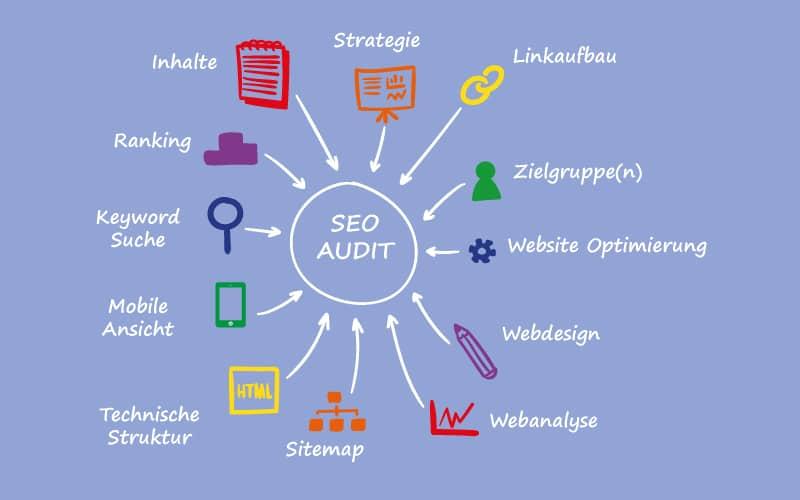
Getting Started: A Step-by-Step Guide to Your First SEO Audit
Ready to dive into the world of SEO? Conducting an SEO audit is a crucial first step to understanding how your website performs in search engines. Here’s a simple, step-by-step guide to help you kick off your journey with your first audit.
Start by defining your goals. What do you want to achieve with your audit? Is it to boost your traffic, enhance user experience, or improve your search rankings? Pinpointing your objectives will help you focus on the right areas during your analysis.
Next,it’s time to gather your data. Utilize some of the best SEO audit tools available, such as:
- Google analytics – For tracking visitor behavior and traffic sources.
- SEMrush – To analyze keywords and competitor insights.
- Ahrefs – Excellent for backlink analysis and site health checks.
- Screaming Frog – A desktop tool that crawls your site to uncover SEO issues.
Once you have your data, move on to analyzing your on-page SEO. Focus on elements such as:
- Title tags: Are they unique and reflective of your content?
- Meta Descriptions: Do they entice clicks while containing relevant keywords?
- Content Quality: Is your content valuable and optimized for your target audience?
Don’t forget to check your site’s technical aspects. Use tools to identify issues like broken links, slow loading times, and mobile-friendliness. These factors play a significant role in user experience, which in turn affects your SEO performance.
compile your findings into a comprehensive report. Highlight areas of improvement and provide actionable recommendations. This document will serve as your roadmap for implementing changes and measuring your progress over time.
By following these steps, you’ll be well on your way to conducting an effective SEO audit that can help elevate your website’s performance and visibility. So grab those tools and get started!
Future Trends in SEO Audit Tools You Should Keep an Eye On
As the digital landscape continues to evolve, so do the tools that help us navigate and optimize our websites for search engines. Keeping up with future trends in SEO audit tools is crucial for maintaining a competitive edge. Here are some exciting developments worth noting:
- AI-Powered Insights: The integration of artificial intelligence into SEO audit tools is set to revolutionize how we analyze data. Expect tools that can not only identify issues but also provide actionable insights based on predictive analytics.
- Real-Time Auditing: Speed is everything in today’s fast-paced surroundings. Future tools will likely offer real-time auditing capabilities, allowing website owners to fix issues on the fly rather than waiting for periodic reports.
- Mobile Optimization Focus: With mobile-first indexing becoming the norm, expect tools to prioritize mobile performance audits.This will include enhanced reporting on mobile user experience, site speed, and mobile usability.
- Enhanced User Experience Metrics: Future SEO audit tools will adopt a more holistic approach,incorporating user engagement metrics such as dwell time and bounce rate to provide a clearer picture of site performance.
- Integration with Other Marketing Tools: Seamless integration with CRM and social media platforms will become a standard feature, enabling a more comprehensive view of how SEO impacts overall marketing efforts.
Along with these trends, we may also see a surge in visual auditing tools, which utilize data visualization techniques to present audit results. This can make it easier for users to identify trends and areas needing attention. Moreover, as voice search continues to grow, SEO tools will likely evolve to include features that help optimize for voice queries, focusing on natural language and long-tail keywords.
Lastly, as data privacy concerns become more pronounced, future tools will need to navigate these challenges. Look for SEO audit tools that emphasize compliance with regulations like GDPR while still providing robust functionality. Keeping an eye on these trends will not only prepare you for the future but also empower you to make informed decisions for your website’s SEO strategy.
Frequently Asked Questions (FAQ)
Q: What is an SEO audit tool?
A: An SEO audit tool is a software application that helps you evaluate your website’s performance in search engines. It analyzes various factors like site structure, content quality, backlinks, and on-page SEO elements.Think of it as a health check for your website, ensuring everything is optimized to improve your search engine rankings.
Q: Why do I need an SEO audit tool for my website?
A: If you want your website to rank higher in search engine results and attract more visitors, you need to know where you stand. An SEO audit tool provides insights into what’s working and what’s not, helping you to identify issues and areas for improvement. in a digital landscape where every click counts, can you afford to miss out?
Q: How often should I conduct an SEO audit?
A: Ideally, you should conduct an SEO audit at least once every six months. However, if you make significant changes to your website, such as a redesign or a content overhaul, it’s a good idea to run an audit right after. Regular audits help you stay ahead of competitors and adapt to changes in search engine algorithms.
Q: What specific features should I look for in an SEO audit tool?
A: Look for tools that offer comprehensive site analysis, keyword tracking, backlink analysis, and competitive insights. You want a tool that provides clear, actionable recommendations. Features like mobile optimization checks, page speed analysis, and the ability to generate easy-to-read reports can also make your SEO efforts more effective.
Q: Can I perform an SEO audit manually?
A: While it’s possible to conduct a manual audit, it can be time-consuming and tedious. Using an SEO audit tool automates the process and ensures you don’t overlook critical areas. Plus, many tools provide advanced insights that you might not easily spot on your own. Why make it harder when you can work smarter?
Q: Are there any free SEO audit tools available?
A: Yes, there are several free SEO audit tools out there, like Google Search Console and Ubersuggest. However, many of the very best tools come with a price tag. Investing in a premium tool can provide more in-depth analysis and features that can significantly enhance your SEO strategy. Remember, you often get what you pay for!
Q: Which are the top SEO audit tools I should consider?
A: Great question! Some of the best tools include SEMrush, Ahrefs, Moz, Screaming Frog, and Google Analytics. Each tool has its unique strengths, so choosing one that aligns with your specific needs is key. Dive into our article for an in-depth look at these tools and how they can elevate your website’s performance!
Q: How can I get started with an SEO audit using these tools?
A: Getting started is easy! Choose an SEO audit tool that fits your needs, sign up, and follow the prompts to analyze your website. Most tools will guide you through the process and help you interpret the results. After the audit, you’ll have a clear action plan to improve your SEO. It’s as simple as that!
Q: How can an SEO audit impact my website’s traffic?
A: A thorough SEO audit identifies issues and opportunities that, when addressed, can lead to improved search engine rankings. Higher rankings typically lead to increased organic traffic, which can result in more leads, sales, or conversions. Ultimately, an SEO audit is an investment in your website’s future success. Are you ready to boost your traffic?
—
Feel free to ask any more questions or share your thoughts about SEO audits!
Key Takeaways
choosing the right SEO audit tool can feel like a daunting task, but it doesn’t have to be! With the options we’ve explored, you have a wealth of powerful tools at your fingertips, each designed to help you pinpoint issues and optimize your website for success. Remember, a thorough SEO audit is not just a box to check off—it’s an essential investment in the health and visibility of your site.
So, why wait? Dive in and start exploring these tools today. Whether you’re a seasoned pro or just starting your digital journey, there’s something here for everyone. With the right tool in your arsenal, you’ll not only enhance your site’s performance but also attract more visitors and ultimately drive growth.
If you found this list helpful,be sure to share it with your fellow website owners or marketers. And don’t forget to let us know your experiences with these tools! Happy auditing!

